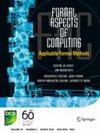Does Every Computer Scientist Need to Know Formal Methods?
IF 1.4
4区 计算机科学
Q3 COMPUTER SCIENCE, SOFTWARE ENGINEERING
引用次数: 0
Abstract
We focus on the integration of Formal Methods as mandatory theme in any Computer Science University curriculum. In particular, when considering the ACM Curriculum for Computer Science, the inclusion of Formal Methods as a mandatory Knowledge Area needs arguing for why and how does every computer science graduate benefit from such knowledge. We do not agree with the sentence “While there is a belief that formal methods are important and they are growing in importance, we cannot state that every computer science graduate will need to use formal methods in their career.” We argue that formal methods are and have to be an integral part of every computer science curriculum. Just as not all graduates will need to know how to work with databases either, it is still important for students to have a basic understanding of how data is stored and managed efficiently. The same way, students have to understand why and how methods work, what their formal background is, and how they are justified. No engineer should be ignorant of the foundations of their subject and the formal methods based on these. In this paper, we aim to highlight why every computer scientist needs to be familiar with formal methods. We argue that education in formal methods plays a key role by shaping students' programming mindset, fostering an appreciation for underlying principles, and encouraging the practice of thoughtful program design and justification, rather than simply writing programs without reflection and deeper understanding. Since integrating formal methods into the computer science curriculum is not a straightforward process, we explore the additional question: what are the trade-offs between one dedicated knowledge area of formal methods in a computer science curriculum versus having formal methods scattered across all knowledge areas? Solving problems while designing software and software-intensive systems demands an understanding of what is required, followed by a specification and formalizing a solution in a programming language. How to do this systematically and correctly on solid grounds is exactly the supported by Formal Methods.每个计算机科学家都需要了解形式化方法吗?
我们重点关注将形式化方法作为必修主题纳入任何计算机科学大学课程的问题。特别是,在考虑 ACM 计算机科学课程时,将形式化方法列为必修知识领域需要论证为什么以及如何让每个计算机科学毕业生从这些知识中受益。我们不同意这样一句话:"虽然我们相信形式化方法很重要,而且它们的重要性也在不断增加,但我们不能说每个计算机科学专业的毕业生都需要在他们的职业生涯中使用形式化方法"。我们认为,形式化方法是而且必须是每个计算机科学课程的组成部分。正如并非所有毕业生都需要了解如何使用数据库一样,让学生基本了解如何有效地存储和管理数据仍然非常重要。同样,学生必须了解各种方法的工作原理和方法,了解这些方法的正式背景,以及这些方法的合理性。任何工程师都不应该对自己学科的基础和基于这些基础的形式方法一无所知。在本文中,我们旨在强调为什么每个计算机科学家都需要熟悉形式化方法。我们认为,形式化方法教育的关键作用在于塑造学生的编程思维,培养对基本原理的理解,并鼓励学生进行深思熟虑的程序设计和论证,而不是简单地编写程序而不加思考和深入理解。由于将形式化方法融入计算机科学课程并不是一个简单的过程,因此我们探讨了另外一个问题:在计算机科学课程中专门设置一个形式化方法知识领域与将形式化方法分散到所有知识领域之间的权衡是什么?在设计软件和软件密集型系统时,要解决问题,就必须先了解需要什么,然后用编程语言规范和形式化解决方案。如何在坚实的基础上系统而正确地做到这一点,正是形式化方法所支持的。
本文章由计算机程序翻译,如有差异,请以英文原文为准。
求助全文
约1分钟内获得全文
求助全文
来源期刊

Formal Aspects of Computing
工程技术-计算机:软件工程
CiteScore
3.30
自引率
0.00%
发文量
17
审稿时长
>12 weeks
期刊介绍:
This journal aims to publish contributions at the junction of theory and practice. The objective is to disseminate applicable research. Thus new theoretical contributions are welcome where they are motivated by potential application; applications of existing formalisms are of interest if they show something novel about the approach or application.
In particular, the scope of Formal Aspects of Computing includes:
well-founded notations for the description of systems;
verifiable design methods;
elucidation of fundamental computational concepts;
approaches to fault-tolerant design;
theorem-proving support;
state-exploration tools;
formal underpinning of widely used notations and methods;
formal approaches to requirements analysis.
 求助内容:
求助内容: 应助结果提醒方式:
应助结果提醒方式:


